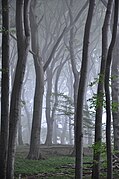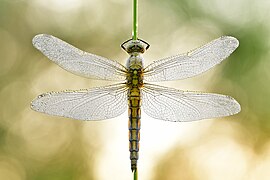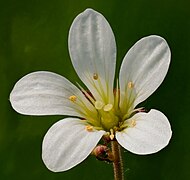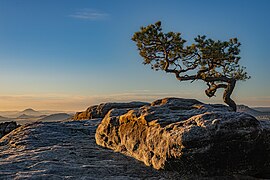User talk:Kersti Nebelsiek
| Babel user information | ||||||
|---|---|---|---|---|---|---|
| ||||||
| Users by language |
User talk:Kersti Nebelsiek/Archiv

|
Pachychile has been listed at Commons:Categories for discussion so that the community can discuss ways in which it should be changed. We would appreciate it if you could go to voice your opinion about this at its entry. If you created this category, please note that the fact that it has been proposed for discussion does not necessarily mean that we do not value your kind contribution. It simply means that one person believes that there is some specific problem with it. If the category is up for deletion because it has been superseded, consider the notion that although the category may be deleted, your hard work (which we all greatly appreciate) lives on in the new category. In all cases, please do not take the category discussion personally. It is never intended as such. Thank you! |
Jmabel ! talk 22:16, 1 January 2024 (UTC)
How to ask for speedy-delete of an empty category
[edit]When you want to ask for speedy-delete of an empty category, best practice is to mark it with {{SD|C2}} if it would be OK to re-create it in the future, given that appropriate content becomes available or {{SD|C1}} if it is an inappropriate category name that should not be reused. In particular, this is better practice than just blanking the category page, as you did at Category:Anopheles crusians. ("C1" and "C2" come from Commons:Criteria for speedy deletion). Jmabel ! talk 21:49, 4 January 2024 (UTC)
- Please, you did this again with Category:Psocodea of Rock Creek Park. This creates unnecessary work for other people. - Jmabel ! talk 04:34, 20 February 2024 (UTC)
{{bad name|Pherbellia scutellaris}}-usually its a typo in the category name
- & again with . - Jmabel ! talk 02:52, 24 August 2024 (UTC)
Wiki Loves Earth 2024 - Deutschland
[edit]Hallo Kersti Nebelsiek,
bald ist es soweit: Vom 1. Mai bis zum 30. Juni 2024 findet zum zwölften Mal der internationale Wettbewerb Wiki Loves Earth (kurz: WLE) statt. Dabei können wie immer Nationalparks, Naturschutzgebiete, Geotope und Naturdenkmäler oder andere Schutzgebiete fotografiert und die Fotos hochgeladen werden. Du hast an einem der vergangenen Fotowettbewerbe teilgenommen. Deshalb laden wir dich ein, auch dieses Jahr wieder mitzumachen. Wir freuen uns auf deine Fotos!
Der Wettbewerb ist zweigeteilt, das heißt, wir unterscheiden zwischen den beiden Wettbewerbskategorien Landschaft und Detail/Makro. Zur Wettbewerbskategorie Landschaft zählen auch geschützte Einzelbäume. In der Wettbewerbskategorie Detail/Makro werden Pflanzen, Tiere und Pilze in den Schutzgebieten bewertet.
Es sind wie immer viele spannende Motive überall in Deutschland zu finden. Neben Naturdenkmälern wie alten Bäumen oder Naturparks im Gebirge und am Meer können Geotope wie Findlinge, Quellen und Aufschlüsse oder FFH-Gebiete fotografiert werden, um sie unter anderem in der Wikipedia zu dokumentieren. Auch im vergangenen Jahr sind zahlreiche neue Listen und Artikel in diesen Bereichen entstanden, die sich über Fotos freuen – zum Beispiel in Bayern die Liste der Naturdenkmäler im Landkreis Landshut oder die Liste der geschützten Landschaftsbestandteile in Mecklenburg-Vorpommern mit ihren Unterlisten oder gar einzelne Artikel wie die Landschaftsschutzgebiete Sommerschafweide an Buchhalden und Sommerschafweide auf Hilbertswiese in Baden-Württemberg.
Wir vergeben in diesem Jahr drei Sonderpreise für Fotos von Feldrainen und Feldgehölzen in geschützten Gebieten.
Als Einstieg für die Suche nach Motiven hilft diese Übersichtsseite. Weitere Informationen erhältst du bei WLE 2024 – Deutschland und unter dieser Anleitung.
Damit es ab 1. Mai mit dem Upload schnell geht:
Außerdem laden wir dich ein, vom 15. Mai bis Mitte Juli 2024 an der Vorjury teilzunehmen. Damit bewertest du die hochgeladenen Bilder und ermittelst so gemeinsam mit der Jury, die Anfang August tagen wird, die Sieger von Wiki Loves Earth 2024 in Deutschland. Das Vorjurytool ist bald hier freigeschaltet. Du benötigst dafür nur deinen Benutzernamen und Passwort.
Für Fragen steht das Organisationsteam gerne auf der Support-Seite zur Verfügung. Falls du im nächsten Jahr keine Einladung für Wiki Loves Earth Deutschland haben möchtest, trag dich bitte hier ein. Wir würden das natürlich schade finden, da wir uns auf deine Fotos freuen.
Viel Spaß und Erfolg beim Fotowettbewerb 2024 wünscht dir im Namen des Organisationsteams --Z thomas 17:50, 24 April 2024 (UTC)
- Hallo Kersti Nebelsiek, vielen vielen Dank für deine zahlreichen spannenden und tollen Bilder zu WLE. Ich hab aber ein paar Hinweise und Bitten.
- Bei WLE freuen wir uns natürlich zum einen über viele Bilder, so wie du sie hochlädst. Das ist enorm wichtig, denn die Anzahl der Uploads ist immer ein Anzeiger für den Erfolg des Wettbewerbs. Deshalb danke für deine Beiträge :-)
- Alle bei WLE eingereichten Bilder werden der Vorjury vorgelegt und müssen durch diese auch bewertet werden. Dies betrifft auch Fotos, die keine Siegchance aber einen dokumentarischen Wert haben, zum Beispiel Aufnahmen von Schildern. Es ist empfehlenswert für diese Bilder die Cat Category:Images from Wiki Loves Earth 2024 in Germany outside of the competition zusätzlich zu verwenden, damit diese Bilder nicht durch die Vorjury bewertet werden aber trotzdem zum Erfolg des Wettbewerbs beitragen.
- Dies Cat empfehle ich auch bei Serien, wenn du ähnliche Bilder vom selben Motiv hochlädst. Serien sind aus dokumentarischer Sicht sinnvoll, aber sie führen zur Ermüdung (Langeweile der Vorjury), weil sie immer dasselbe Bild sieht. Deshalb ist unsere Empfehlung, bei Serien nur ein paar Bilder der Serie (2 bis 3) der Vorjury vorlegen und den rest auch mit der Category:Images from Wiki Loves Earth 2024 in Germany outside of the competition zu versehen.
- Mach das bitte auch bei Gebäuden, die im Schutzgebiet liegen. Ich freu mich auf weitere Bilder von dir. Viele Grüße Z thomas 06:50, 30 May 2024 (UTC)
Welcome, Dear Patroller!
[edit]

Hi Kersti Nebelsiek,
You now have the Patroller right and may call yourself a patroller! Please take a moment to read the updated Commons:Patrol to learn how Patrolling works and how we use it to fight vandalism.
As you know already, the patrolling functionality is enabled for all edits, not just for new-page creations. This enables us to keep track of, for example, edits made by anonymous users here on Commons.
We could use your help at the Counter Vandalism Unit. For example by patrolling an Anonymous-edits checklist and checking a day-part.
If you have any questions please leave a message on the CVU talkpage or ask for help on IRC in #wikimedia-commons. Kadı Message 17:55, 16 June 2024 (UTC)
Wiki Loves Earth 2024 - Deutschland - Vielen Dank für deine Teilnahme
[edit]
Hallo Kersti Nebelsiek,
Wiki Loves Earth 2024 in Deutschland ist beendet. Du hast mit deinen hochgeladenen Fotos zum Gelingen des Wettbewerbs beigetragen. Vielen Dank für deine Fotos, sie sind ein wertvoller Beitrag, das Thema Naturschutz in der Wikipedia zu dokumentieren. Es wurden über 16.000 Fotos hochgeladen, du findest alle in der Kategorie Images from Wiki Loves Earth 2024 in Germany.
Bis zum 19. Juni 2024 kannst du die hochgeladenen Fotos im Vorjurytool bewerten. Vom 2. bis zum 4. August 2024 kürt dann die Jury die Siegerbilder, vielleicht ist eins deiner Bilder dabei.
Wir möchten den Wettbewerb besser machen, aus diesem Grund haben wir eine kleine anonyme Umfrage vorbereitet. Wir freuen uns, wenn du daran teilnimmst.
Vielen Dank im Namen des Organisationsteams und bis spätestens nächstes Jahr, wenn Wiki Loves Earth 2025 stattfindet. GPSLeo (talk) --MediaWiki message delivery (talk) 13:37, 15 July 2024 (UTC)
Category:Kersti_Nebelsiek_-_Gerhard-Holten-Hütte,_Osterbachtal,_Tauberseck,_Mühlbach,_Untermühle_in_Knickhagen,_Gänseberg,_Krummbachtal_(15._und_17._November_2022)
[edit]
|
Kersti Nebelsiek - Gerhard-Holten-Hütte, Osterbachtal, Tauberseck, Mühlbach, Untermühle in Knickhagen, Gänseberg, Krummbachtal (15. und 17. November 2022) has been listed at Commons:Categories for discussion so that the community can discuss ways in which it should be changed. We would appreciate it if you could go to voice your opinion about this at its entry. If you created this category, please note that the fact that it has been proposed for discussion does not necessarily mean that we do not value your kind contribution. It simply means that one person believes that there is some specific problem with it. If the category is up for deletion because it has been superseded, consider the notion that although the category may be deleted, your hard work (which we all greatly appreciate) lives on in the new category. In all cases, please do not take the category discussion personally. It is never intended as such. Thank you! |
Enhancing999 (talk) 13:32, 4 August 2024 (UTC)
Wiki Loves Earth 2024 - Deutschland - Ergebnisse veröffentlicht
[edit]Hallo Kersti Nebelsiek,
die Ergebnisse von Wiki Loves Earth 2024 in Deutschland sind nun veröffentlicht. Vorjury und Jury haben aus 12.000 Fotos im Wettbewerb die besten 50 Einreichungen in den Kategorien Landschaft und Detail sowie drei Fotos mit Sonderpreisen ausgezeichnet. Wenn deine Fotos unter den ersten Plätzen sind und du einen Gutscheinpreis erhältst, hast du bereits eine Nachricht erhalten.
- Sieger WLE 2024 – Detail
-
Stephan Sprinz - Blühendes Strand-Milchkraut am Strand von Norderney
-
Peach-Boy11 - Eine parasitische Sichelwespe bei der Eiablage in eine Raupe
-
Oliver Knebel - Kupfer-Rosenkäfer im Naturschutzgebiet Dörscheider Heide
- Sieger WLE 2024 – Landschaft
-
T meltzer - Lilienstein im Elbsandsteingebirge
-
Thomas Hummel - Ahbach (Ahr) im Naturschutzgebiet am Wasserfall Dreimühlen
-
Roman Eisele - Trockenmauern der ehemaligen Weinberge im Naturschutzgebiet Hirschauer Berg
Hier findest du alle ausgezeichneten Fotos.
Wir haben dir bereits den Link zu unserer Umfrage geschickt. Wenn du sie noch nicht ausgefüllt hast, würden wir uns freuen, wenn du noch bis zum Sonntag den 18. August teilnimmst.
Falls du nicht bis 2025 auf den nächsten Fotowettbewerb warten willst, kannst du im September bei Wiki Loves Monuments in Deutschland oder einem anderen der teilnehmenden Länder deine Fotos zum Thema Kulturerbe hochladen.
Noch einmal vielen Dank im Namen des Organisationsteams und der Jury GPSLeo (talk) MediaWiki message delivery (talk) 05:15, 15 August 2024 (UTC)
Round 1 of Picture of the Year 2023 voting is open!
[edit]
Dear Wikimedian,
Wikimedia Commons is happy to announce that the 2023 Picture of the Year competition is now open. This year will be the eighteenth edition of the annual Wikimedia Commons photo competition, which recognizes exceptional contributions by users on Wikimedia Commons. Wikimedia users are invited to vote for their favorite images featured on Commons during the last year (2023) to produce a single Picture of the Year.
Hundreds of images that have been rated Featured Pictures by the international Wikimedia Commons community in the past year are all entered in this competition. These images include professional animal and plant shots, breathtaking panoramas and skylines, restorations of historical images, photographs portraying the world's best architecture, impressive human portraits, and so much more.
For your convenience, we have sorted the images into topical categories. Two rounds of voting will be held: In the first round, you may vote for as many images as you like. The top 30 overall and top 5% of most popular images in each category will continue to the final. In the final round, you may vote for just three images to become the Picture of the Year.
Round 1 will end on UTC.
Thanks,
the Wikimedia Commons Picture of the Year committee
You are receiving this message because you voted in the 2022 Picture of the Year contest.
MediaWiki message delivery (talk) 17:06, 1 October 2024 (UTC)
Albinism vs. leucism
[edit]Hi,
Saw your edit of the squirrel photo. Albinism is sometimes to blame when you see an all-white version of an animal, but not always. Albinism is a genetic mutation that prevents the production of melanin; leucism reduces all types of pigments in ways that can cause a similar appearance, but there's still some melanin in the body. That's why looking at the eye can be diagnostic -- if there's no melanin at all, it'll look reddish; if there's some melanin it'll look more normal. Leucism is also just more common at birth, and animals with leucism are usually a bit healthier than those with albinism for a variety of reasons. FWIW. :) — Rhododendrites talk | 17:27, 1 October 2024 (UTC)
Prototyperspective (talk) 09:55, 13 October 2024 (UTC)
Prototyperspective (talk) 09:59, 13 October 2024 (UTC)
Prototyperspective (talk) 10:19, 13 October 2024 (UTC)
Prototyperspective (talk) 10:30, 13 October 2024 (UTC)
Prototyperspective (talk) 10:31, 13 October 2024 (UTC)
Round 2 of Picture of the Year 2023 voting is open!
[edit]
Read this message in your language
Dear Wikimedian,
You are receiving this message because we noticed that you previously voted in the Picture of the Year contest. Wikimedia users are invited to vote for their favorite images featured on Commons during the last year (2023) to produce a single Picture of the Year.
Hundreds of images that have been rated Featured Pictures by the international Wikimedia Commons community in the past year were entered in this competition. These images include professional animal and plant shots, breathtaking panoramas and skylines, restorations of historical images, photographs portraying the world's best architecture, impressive human portraits, and so much more.
In this second and final round, you may vote for a maximum of three images. The image with the most votes will become the Picture of the Year 2023.
Round 2 will end at UTC.
If you have already voted for Round 2, please ignore this message.
Thanks,
the Wikimedia Commons Picture of the Year committee
MediaWiki message delivery (talk) 17:12, 16 October 2024 (UTC)











